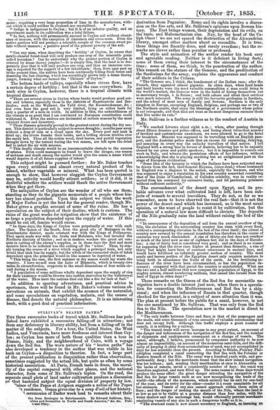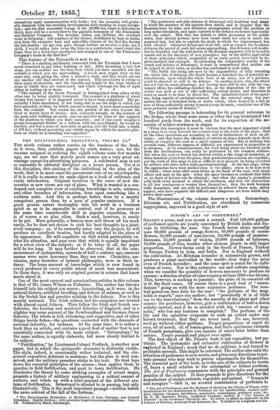SULLIVAN'S BEATEN PATHS. * THE three successive books of travel which
Mr. Sullivan has pub- lished have exhibited a successive falling-off in attraction ; not from any deficiency in literary ability, but from a falling-off in the matter of the subjects. For a tour, the -United States, the West Indies, and Venezuela, have more freshness and interest than Cey- lon; as Ceylon has more of both those qualities than a tour in France, Italy, and the neighbourhood of Cairo, with a voyage down the Red Sea. The worn nature of his "beaten paths" has also developed a tendency in the author that was visible in his book on Ceylon—a disposition to theorize. In fact, a large part of the present publication is disquisition rather than observation, sometimes suggested by the actual life, but quite as often by some historical association. At Paris, French taste in dress, the moral- ity of the capital compared with other places, and the national character, form some of Mr. Sullivan's topics. On the road, the separate small plots of land under cultivation produce a discussion on that haoknied subject the equal division of property by law. "dace of the Popes at Avignon suggests a notice of the Popes 4r residence. Genoa gives rise to a coup d'ceil of her history. ceremonies of Easter week lead to remarks about their the from Boulogne to Babelinandeb. By Edward Sullivan, Esq., robin and Scrambles in North and South America," &c. &c. Pub- s and Otley.
derivation from Paganism. Rome and its sights involve a discus- sion on the fine arts, and Mr. Sullivan's opinions upon Roman his- tory. The East brings women, their degradation and its evils, on the tapis, and Mahometanism also. Nay, by the head of the Ca- liph Omer ! we are not spared the destruction of the Alexandrian library, amongst other matters about as recondite. It is true, these things are fluently done, and rarely overdone; but the re- marks are clever rather than peculiar or profound. The style and animation of the author render his book easy and agreeable reading. Neither is it deficient in living facts ; some of them owing their interest to the circumstances of the time; some of them, we think, to the penetration of the author. This remark on the stature of the Genoese, and the predilection of the Sardinians for the army, explains the appearance and conduct of their soldiers in the Crimea.
"The Genoese are, I think, the handsomest of the Italian race; after the French, they appeared almost gigantic. In olden days, when hard beads and hard knocks were the moat valuable commodities a man could bring to the world's market, the Genoese were in the habit of hiring themselves out as mercenary troops, a la Suisse; and both ashore and afloat their services were much esteemed. The army is still the favourite profession in Sardinia, and the school of most men of family and fortune. Sardinia is the only kingdom in Europe, excepting England, Belgium, and perhaps one or two of the Northern courts that enjoy the blessings of a government whose policy is not retrograde, and that does not treat as its most dangerous enemies those that live under its rule."
Mr. Sullivan is a further witness as to the conduct of Austria in Italy.
"We reached Livorno about eight a. m.; when, after passing through about fifteen douanes and police-offices, and feeing about twice that number of facchini and customhouse examiners, we were allowed to go to the hotel for breakfast. Mazzini was supposed to be travelling with an English pass- port, and the Austrian police made that an excuse for examining, delaying, and annoying in every way the unlucky travellers of that nation. I left
i
England with a strong bias n favour of Austria, believing her to be unjustly abused by our press and public speakers ; but it is impossible to remain one week in Italy, and witness the pernicious effects of her influence, without acknowledging that she is playing anything but an enlightened part on the stage of European civilization. "Some idea of the tyranny to which the Italians have been subjected may be drawn from the fact, that General Haynau, (since dead,) whose treatment in England was a disgrace to the nation, especially the brewers, and who was supposed to enjoy a reputation in his own country somewhat resembling that of the Duke of Cumberland, of Culloden celebrity, was in reality re- moved from his command for excessive lenity, and for pardoning prisoners without sufficient authority."
The encroachment of the desert upon Egypt, and its pro- bable advance over what cultivated land is left, have been sub- jects of remark to several travellers. They do not, so far as we remember, seem to have observed the real fact—that it is not the power of the desert sand which has increased, as is the most usual opinion, or the want of people to resist it by cultivation, but the operation of a natural law more difficult to obviate. The deposits of the Nile gradually raise the land without raising the bed of the river.
"In consequence of the deposition of soil from the annual overflow of the Nile, the elevation of the surrounding country has risen with every flood, without a corresponding elevation in the bed of the river itself ; the extent of country now covered by the annual inundation has therefore in the course of centuries very much diminished. A rise of thirty-six feet does not overflow so much of the level now as one of eighteen feet did in the days of Herodo- tus; a rise of thirty feet is considered very good; and as there is no reason for supposing that the river rises higher at present than formerly, a rise of thirty feet might have been of constant occurrence in ancient days, and would have fertilized an infinitely greater surface of country. The most sandy and barren portion of the Egyptian desert only requires moisture to bring forth in abundance the fruits of the earth. As the fertilizing in- fluences of the river have been circumscribed, so has the population de- creased ; compared with that period the country is uninhabited. What are the two and a half millions that now compose the population of Egypt, to the mighty armies, almost numbering millions, that issued like locusts from the land of Egypt in olden days ?"
These remarks on the fitness of the Red Sea for mercantile na- vigation have a double interest just now, when there is a specula- tion for connecting the Mediterranean and Red Sea by a ship- canal ; and when the influence of Russia in that quarter, though checked for the present, is a subject of more attention than it was. The plan at present before the public for a canal, however, is not the one mentioned by Mr. Sullivan. That was only from the Red Sea to the Nile. The speculation now in the market is direct to the Mediterranean.
"The only traffic between Cairo and Suez is that of the passengers and the mails, and some thousands of tons annually of valuable merchandise that does not occupy bulk. Although this traffic employs a great number of camels, it is nothing for a railway.
"The transit trade will never increase to any great extent, on account of the danger and tediousness of the navigation of the Red Sea, and the number of shipments and unahipments consequent on a change of vessels. The canal, although, I believe, pronounced by competent authority to be now almost an impossibility, on account of the numerous sand-hills, and the diffi- culty of keeping it clear from accumulations of sand, was yet accomplished in days far less scientific than the present. According to Strabo, Ptolemy.Phil- adelphus completed a canal connecting the Red Sea with the Pelusuic or Eastern branch of the Nile. The canal was a hundred yards wide, and pro- portionably deep ; but the merchants found that the slow inland navigation was too tedious ; and, sending their merchandise at once to Alexandria on the backs of camels, saved a considerable number of days : the canal was therefore neglected, and soon filled up. The same causes in these days would produce the same effect: the great danger attending the navigation of the Red Sea for large vessels such as are now monopolizing the trade of the world—the effects of the monsoons, which entirely bar its exit for one-half of the year, and its entry for the other—render it a route unsuitable for all but steamers. Vessels of any size cannot approach within three miles of Suez ; and the danger of making the mouth of the Nile, where the land is so low as not to be visible at a greater distance than four miles, with the water shallow and the anchorage bad, would effectually prevent merchants employing vessels of any size in such a dangerous traffic as it is.
i
"The overland route s now almost necessary to England, as insuring an excessively rapid communication with India ; but the necessity will gradu- ally diminish with the startling developments daily making in ocean naviga- tion; and the first sucoessful voyage of the 23,000-ton vessel to Calcutta in thirty days will be a severe blow to the gigantic monopoly of the Peninsular and Oriental Company. For invalids, ladies, and children, the overland route is fatiguing ; and numbers of the former debilitated by heat in India, sink from the excessive heat and unhealthy climate of the Red Sea during the hot months : for my own part, though neither an invalid, a lady, nor a child, I would rather take twice the time in a comfortable vessel round the Cape, than be a third time smothered and cramped in one of the Peninsular Company's boats in the Red Sea."
This feature of the Pyramids is new to us. "There is a striking peculiarity connected with the Pyramids that I have never remarked in any other building or hill. After mounting a very few steps, you can neither see the base from which you have ascended nor the summit to which you are approaching. A dozen men might start on the same side, each giving the other a minute's start, and they would not see one another till they arrived at the summit. This peculiarity is owing to their angle of elevation, and the breadth and height of the large blocke of stone of which they are constructed, and which intercept...the line of sight either in looking up or down. • • * • "The summit of the Great Pyramid is distinguished from either of the other two by being slightly truncated. The summit is a platform of about twenty feet square: it is supposed never to have been completed. The pe- culianty I have mentioned, of not being.able to see the steps by which you have ascended, or those by which you are to mount, is even more remarkable from the summit. You cannot see any portion of the sides beyond the third or fourth layer of atones; • and, curiously enough, on the summit of the most solid building on earth, you can perceive no signs of the supports of the platform to which you have mounted ; and if one could imagine a person transported thither in a balloon with his eyes blinded, he would be startled, and feel a sense of insecurity at gazing over the brink into a depth of 470 feet, without perceiving any visible means by which the massive plat- form on which he is standing was supported.'



























 Previous page
Previous page